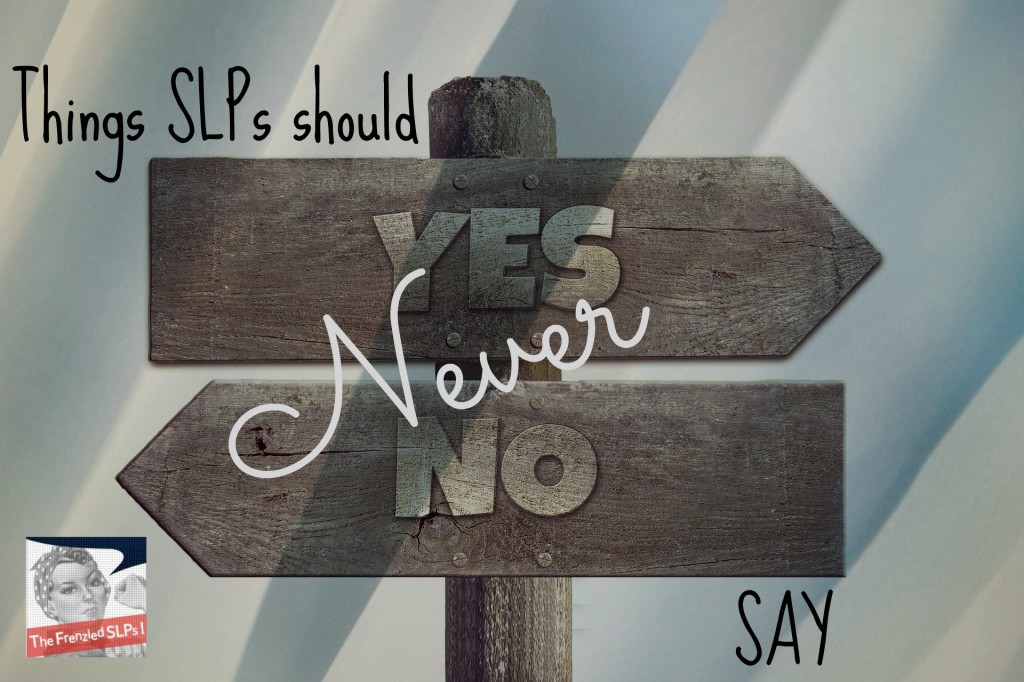As SLPs, we strive to be supportive and positive with our students while addressing their communication goals, so reflecting on not-so-positive words that may come up during our daily interactions took some thought. What I concluded is that sometimes even positive words need to be used selectively, therefore, at the top of my list of “Things SLPs Should Never Say” I would list the phrase, “Good Job!” It does seem contradictory to view a positive message as a negative one as well, however there are several reasons why. I think it would be safe to say that “Good Job“ is one of the most overused phrases in education (and in parenting as well.) I’m guilty of using this phrase way too much myself (at home and at school) but I’m working on using more effective ways of acknowledging my student’s and my own child’s behaviors and responses. The phrase seems to naturally and automatically flow from our stream of thought and onto our lips, however there are several reasons we should reconsider using these two seemingly well-intentioned words.
1. Students will come to expect it. Mary Budd Rowe, a researcher at the University of Florida, discovered that students who were praised lavishly by their teachers were more tentative in their responses and more apt to answer in a questioning tone of voice. They tended to back off from an idea they had proposed as soon as an adult disagreed with them, and they were less likely to persist with difficult tasks or share their ideas with other students. “Good job!” doesn’t reassure children; ultimately, it makes them feel less secure. It may even create a vicious cycle such that the more we pile on the praise, the more kids seem to need it, so we praise them some more. By creating so-called “praise junkies” some kids will grow into adults who continue to need someone else to pat them on the back and tell them whether what they did was okay.
2. It can interfere with how good a job children actually do. Researchers keep finding that kids who are praised for doing well at a creative task tend to stumble at the next task – and they don’t do as well as children who weren’t praised to begin with. What kids do need is unconditional support with no strings attached, which is the opposite of praise. “Good job!” is conditional. It means we’re offering attention, acknowledgement and approval for doing things that please us.
3. There are better options:
- Say nothing. We often assume that a response must be “reinforced” with an immediate verbal reward. It is often the case that we want to praise, our kids don’t really need to hear it. Students do not (should not) expect to be praised all the time, so the next time you feel the urge to say “good job,” simply say nothing at all. Observe if your students continues to provide responses and interactions despite the lack of praise.
- Say what you saw. A simple praise-free statement such as “You made that sound with your tongue in the right place.” “You put all those steps in the correct order” or even just “You did it” shows that your recognize their effort and success. It also lets your student take pride in what she did. By doing this, you are providing feedback, not judgment, about their response.
- Talk less, ask more. Instead of offering the instant gratification of “Good Job” when a student provides a response, ask him further questions about his response and address higher level thinking. Delving into follow up questions such as “who”, “what” , “when”, “where”, “why” and “how” will elicit further interest in their responses and grow a students interest and understanding of a topic. Saying “Good job!” may have exactly the opposite effect since it does not encourage further conversation.
4. Substitute other phrases for “Good job!” My friend and fellow-SLP, Erik Raj, wrote a post a while back entitled “25 Ways to Praise Students in Speech Therapy.” He feels that the phrase “Good Job” is overused, becomes a bit monotonous, predictable and boring. I agree with Erik! He created this FREE poster which includes 25 ways to praise your students. Download his freebie and keep it tucked away in your planner or hung up in clear site. The next time you offer positive verbal feedback to your students, remember to change it up and try out a few new praise-worthy words!
Are you curious what other SLPs are blogging about? What other things should SLPs never say? Check out their thoughts in the linky below!












Agreed! I’m learning to use growth language with my students and children. It’s hard to get away from “good job”, but makes so much sense.
I’m going to watch myself with that familiar phrase of praise now! Thank you for all of your links and well written post. Sincerely, Manda
What a treat to read this post. Every time I hear good job in response to every blessed thing a child does I cringe. It is so important to provide specific feedback about what the child has done, and yes, sometimes a smile and a nod is enough. When something becomes overused it loses its value.
A very thoughtful post! I try to make positive comments specific to the task and progress made, but I will be watching to make sure!
Love this spin on the topic! I had to go back and look to see if I included “good job” in my post! I LOVE Erik Raj…I’m definitely going to check out that post!